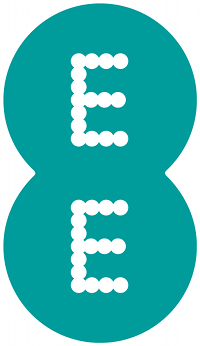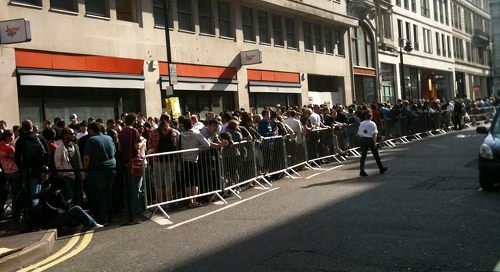Blog posts tagged iPhone
Be one of the first to get iPhone 5 with 4G
 Last week's iPhone 5 launch was thin on surprises, but many will have been excited to see that the new iPhone includes 4G connectivity. This new mobile internet internet standard allows for much faster connections than the current 3G networks.
Last week's iPhone 5 launch was thin on surprises, but many will have been excited to see that the new iPhone includes 4G connectivity. This new mobile internet internet standard allows for much faster connections than the current 3G networks.
We tested a 4G connection earlier this year and we were impressed. It managed to beat most broadband connection speeds convincingly, even from the top deck of a number 25 bus.
4G is coming soon
Back then it looked like we wouldn't see 4G in the UK till next year. But things have changed since, and EE - a new network from the same people who run Orange and T-Mobile - is set to launch 4G in selected UK cities before the end of the 2012. Superfast mobile connections could be closer than you think.
In a bit of a double blow to the other UK mobile networks, not only is EE launching 4G first, but it also looks like it'll be possible to get an iPhone 5 on the new network pretty much from day one.
Sign up now for a 4G iPhone
If you do want to be a 4G trailblazer with an iPhone 5 the advice is to move quickly. Pre-order your iPhone 5 now with Orange or T-Mobile and you'll be able to move to a 4G EE contract once the network launches properly. And - of course - in the meantime you'll be able to use your shiny new iPhone 5 on the Orange or T-Mobile networks.
You will have to lock yourself into a two-year contract (at a minimum of £36 a month), and pay anything up to £269 up front for the phone, depending which model you want and which monthly plan you choose.
It's also not clear exactly how much an EE tariff will cost, although you should be able to switch without penalty and it sounds like prices should be fairly comparable.
In all, if you want to be at the forefront of mobile internet access then this doesn't look to be a bad way of going about it.
(Before you order, make sure you have a read of the EE website. At launch it looks like 4G will only be available in London, Birmingham, Leeds, Cardiff, Bristol, Edinburgh, Manchester, Liverpool, Glasgow and Sheffield, with more cities added by the end of the year.)
What to expect from iPhone 5 ... and the phones that already deliver it

A queue outside a London Apple Store for iPhone 4. (Image: Eddie Shannon on Flickr.)
Unless one of the world's most valuable companies is trying to mislead us all, Wednesday will see Apple unveil iPhone 5. The latest in its line of smart phones, the shiny, desirable object will almost certainly prompt long queues at Apple stores and deliver a surge in sales. Shareholders must be rubbing their hands with glee.
Rumours abound about what new features iPhone 5 will have, and some of the less outlandish suggestions seem pretty much guaranteed. We look at three top feature rumours and ask whether they'll really make a difference to how your use your phone. We've also rounded up some phones which already offer them.
1. A bigger screen
Although smart phone screens have grown larger over the last couple of years, Apple has stuck with a 3.5" screen for its iPhone. Expect that to change for iPhone 5, which looks likely to offer a 4" screen that will be taller, yet no wider. It'll allow more space for apps, email, websites and maps, without making the phone harder to use one-handed.
Is it worth having?
Probably. A larger screen may appeal to existing iPhone users, and taller-but-not-wider proportions would keep the phone more pocket-sized and easy to work with one hand. However, big screens often mean reduced battery life, and can an extra half inch really make that much difference?
Other options
There are heaps of smart phones out there with bigger screens. But if you really want a phone with a large screen, why hold back? The Samsung Galaxy S3 has a huge 4.8" screen, which is certainly handy for viewing websites and documents. It costs around £450 to buy outright, or you can get it for £25 when you sign up for a £36 a month contract with T-Mobile.
2. A new connector
Apple's range of iPods and iPhones uses a long, thin connector for charging and transferring data. But to keep the phone as small as possible, it looks like the company will move to a smaller connector with iPhone 5. This will frustrate existing iPhone owners, who will - presumably - have to ditch all their accessories if they decide to upgrade.
Is it worth having?
No. Engineering benefits aside, any change to the connector will simply spell inconvenience for existing iPhone owners who are upgrading. It also means none of the super-cheap iPhone cables you can currently find online will work.
Other options
Apple seems to take pleasure in forcing its own standards onto things like connectors, yet there's a perfectly good universal connector out there. It's called Micro USB, and you'll find it on many other handsets including the Nokia Lumia 800. This mid-range Windows Mobile handset is available for free with a £30 a month Three Mobile contract, or for £300 outright.
3. A faster processor
Today's smart phones are super powerful. Pretty much whichever one you buy is likely to have more than enough oomph for web browsing, playing games and so on. I've had an iPhone 4S for months and it's still snappy with no sign of slowdown. However, many experts expect iPhone 5 to come with a quad-core processor, which should make the phone faster when you're running several apps.
Is it worth having?
At the moment, there's little benefit because few apps require all that processing power. Fast forward a year though, and you might be glad of the power - historically, the iPhone's new features have only been fully exploited over time.
Other options
There's no shortage of quad-core smart phones on the market at the moment. The HTC One X is a monstrously-powerful handset that's received excellent reviews. It's free with a £36 a month T-Mobile contract, or you can get it with no ties for £419.
Apple's box of tricks
The big unknown with any Apple launch is, of course, which of the more outlandish rumours are true. Could we see a phone with a built-in chip that allows you to pay for things, fingerprint recognition ... or something that nobody has guessed yet? Find out on Wednesday.
Five simple apps to help your business keep good financial records

How not to look after your receipts (Image: Flickr user Carly & Art under Creative Commons.)
Maintaining financial records can be tricky for the smallest businesses, like sole traders and companies below the VAT threshold. There's a temptation to simply bumble through and hope you don't miss anything.
The inevitable result is that your tax return is painful. You spend about three days hunting for paperwork that hasn't been eaten. Then you sheepishly give your accountant a shoebox full of crumpled, illegible receipts and politely ask them to sort it all out.
It costs you in time, in accounting fees and in expenses you failed to claim back because you've lost the receipts or forgotten about them.
Do little and often
Like most things, keeping up with your accounts is easiest if you do it little and often. Don't wait till the end of the month to record all your expenses - do them every week, or every day.
And that's why it's interesting that, buried away on the HMRC website in the 'support for software developers' section (yep, I bet you've checked that page recently), is a handy list of five mobile apps designed to help smaller businesses keep good records.
Using a mobile app makes sense. You'll always have your phone with you, so it's a good tool for noting down expenses, payments and so on. You can even photograph receipts with your phone's camera.
Here are the five apps listed on the HMRC website that could make your record keeping a little easier. Most are from established accounting software firms, so if you already use accounting software it's probably a good idea to try the matching app first.
For iPhone and iPad:
- Intuit MyBizTracker. This app from the makers of QuickBooks lets you record income and expenses so you can check your position at a glance. You can also snap a photo of receipts with your phone's camera, to save with the other details.
More about MyBizTracker >> - Sage Record Keeper. This app is from the makers of the comprehensive Sage accounting software. It offers similar functions to MyBizTracker, but can also handle CIS deductions (which only apply to businesses in the construction sector).
More about Record Keeper >> - Earnest. With similar photo functions to the other apps, the main difference with Earnest seems to be that it'll give you a rough idea of your tax liability at any moments. It's from the people who make FreeAgent accounting software.
More about Earnest >>
For Android devices:
- ZipZipBooks. Although it promises similar features to all the other apps listed here, ZipZipBooks is specifically designed for companies in the construction and property sectors. From the screenshots, it looks quite utilitarian.
More about ZipZipBooks >> - Forbes Record Keeper. Scant information is available from the 1999-style Forbes Computer Systems site. But this app is similar again, although its ability to send data to a Dropbox account might be useful if you use the online backup service.
As all these apps are free, the best way to figure out if they work for you is probably just to try them. Let us know how you get on! You can see the list on the HMRC website too.
There was something about Steve Jobs...
 I've just lost a brilliant, inspiring potential sales director. Here I am, a hot startup in the search space with tons of VC backing, an emerging market and offering a great salary and significant stock options and I lose to a huge American corporation.
I've just lost a brilliant, inspiring potential sales director. Here I am, a hot startup in the search space with tons of VC backing, an emerging market and offering a great salary and significant stock options and I lose to a huge American corporation.
Aren't big corporations supposed to be terrible to work for? Aren't they supposed to be nasty to their people and only attract second raters?
The corporation in question in this case is Apple. As an ardent Apple fan of four years (since the first MacBook Air) I can't even get bitter and twisted over this loss. I actually found a worthy competitor. And for the first time in my life I actually didn't mind coming second.
What is it about Apple?
Steve, you did a brilliant job of being clever more than once. Everyone is allowed to be clever once, few achieve it. But Steve, you did it time after time after time. iMac, Air, iPod, iPhone, iPad.
How?
It's in the team. Steve was a talent magnet. And a generous one to boot. Some of his key people had stock options in the range of hundreds of millions of dollars. Many middle managers are millionaires.
Whilst he was clearly becoming sicker over that last year he was neatly handing over the responsibility of the business to trusted lieutenants – the likes of design genius Jonathan Ive and logistics genius Tim Cook.
What you have bequeathed us Steve is not only brilliant products (you have to try the iPhone's new artificially intelligent assistant, Siri, it’s incredible) but a world class example of how to run a business that is capable of repeating success through talent acquisition.
What was it Lyndon Johnson said? "If you recruit someone who is better than you then you conclusively prove you are better than they." So true.
Thanks Steve.
John Straw is an expert contributor to Marketing Donut and the founder and VP of Business Development of Linkdex.



